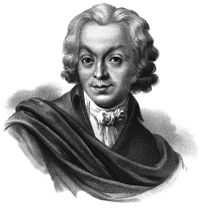Vasily Kapnist

Count Vasily Vasilievich Kapnist (Russian: Василий Васильевич Капнист, Ukrainian: Василь Васильович Капніст), (23 February 1758 – 9 November 1823), was a Russian and Ukrainian poet and playwright who wrote in somewhat rough Russian.
Kapnist, whose Greek-speaking grandfather left Zakynthos to fight for Peter the Great, was a scion of the Venetian Counts Capnissi (whose name derives from the Zakynthos surname Καπνίσης[1]), yet he spent all his life in the manor of Obukhovka near Poltava. Vasily's ancestors were Colonels of Cossacks in Ukraine. His lifelong friendship with Nikolay Lvov and Gavrila Derzhavin date from the early 1770s, when all three served in the Leub Guard. Derzhavin later married Kapnist's sister-in-law and visited the poet and his wife in Obukhovka more than once.
The extension of Russian serfdom to the Ukrainian lands dismayed Kapnist and occasioned his two most notable poems, Ode on Slavery (1783) and Ode on the Elimination of Slavery in Russia (1786), in which he chastised serfdom as the principal pest of contemporary Russian society. His later poems belong to the Horatian tradition, anticipating Russian Romanticism in their social pessimism and admiration of simple family joys.
Kapnist revealed himself as a savage satirist in his most famous work, a satirical verse drama based on the poet's litigation against a neighbour and aptly entitled Chicane (1798). His victims are the judges and officers of law, whom he paints as an unredeemed lot of thieves and extortioners. The play is in rather harsh Alexandrines but produces a powerful effect by the force of its passionate sarcasm.

Although Kapnist dedicated his play to Emperor Paul, it was denounced by the censorship as scurrilous and libertarian. Banned after only four performances, it was not revived in St. Petersburg until 1805. According to D.S. Mirsky, "the two greatest Russian comedies of the 19th century, Griboyedov's Woe from Wit and Gogol's Inspector General, owe not a little to the crude and primitive comedy of Kapnist".[2]
References
- ↑ B.O. Unbegaun, Russkie familii (Moscow: Univers, 1995), p. 275.
- ↑ D.S. Mirsky. A History of Russian Literature. Northwestern University Press, 1999. ISBN 0-8101-1679-0. Page 56.
External links
- (Russian) Biography of Kapnist
- (Russian) Kapnist. Poems
- English translations of 4 epigrams
|